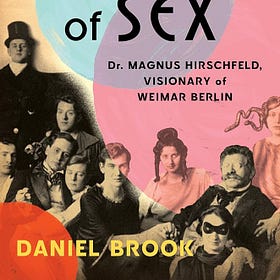It's Time We Learned About the Einstein of Sex
With Daniel Brook
In The Einstein of Sex: Dr. Magnus Hirschfeld, the Visionary of Weimar Berlin, Daniel Brook revives the life story of an influential German thinker far ahead of his time.
More than a century ago, Magnus Hirschfeld argued that gender and sexuality are fluid—and later, that race is a social construct. As you might expect, the Nazis weren’t fans, but they didn’t write Hirschfeld out of history. That erasure happened in the U.S., even though, as Daniel and I discuss, it was Hirschfeld’s books destroyed at the infamous book burning in 1933. In a time of resurgent fascist politics, Daniel told me, “It’s high time” we learned about Magnus.
Daniel Brook is a journalist and author whose writing has appeared in Harper’s, The New York Times Magazine, and The Nation. He’s now the author of four books. A condensed transcript of our conversation, edited for clarity, is below. You can also listen to us on the Skipped History podcast:
Ben: To clear the air up top, I want to say that The Einstein of Sex is not about me. Just in case anyone was confused.
DB: Haha. My partner’s joke is, “Unfortunately, it's not a how-to manual.”
Ben: An important clarification!
To get into the history, you write that for a queer teen like Magnus Hirschfeld, “German society felt like a straitjacket.” Can you go into more of that background for us, please?
DB: So he was born in 1868, technically in Prussia, which became Germany three years later. Germany was both racing into the future and slipping into the past.
Berlin was booming, growing so fast that it’s often compared to Chicago after the fire. There was all this technological and urban progress. Georg Wilhelm Friedrich Hegel argued that the modern Prussian state was the endpoint humanity had been working towards for thousands of years.
And yet, it was also a time of rising antisemitism and homophobia. Antisemitism was morphing from a religious idea—that the Jewish people have misguided theological beliefs about the divinity of Jesus—into this racialized antisemitism, where Jews are seen as a kind of racial other group. Meanwhile, in an updated take on homosexuality being a sin, society saw it as a psychological disorder: that there was something wrong with you.
Magnus faced both obstacles when trying to fit in.
Ben: You describe an “overperformance of masculinity” in Germany at the time. Chancellor Otto von Bismarck “was fond of appearing in full military regalia crowned by a Pickelhaube, a hard hat topped by a shiny metal phallic symbol... the leader of the new Germany pranced around with what was essentially a dildo on his head.”
Amazing description. People wearing literal “pickle hoods” while also being like, oh, there's no room for gay people here, gives a good sense of what Germany was like.
DB: Yes. As Magnus grew up, he ended up in this kind of frenemy relationship with Sigmund Freud. Freud argued that kids turned queer because of some kind of childhood trauma—an icy mother or a dead father or the maid dropping you on your head, that kind of thing. Hirschfeld was arguing that queer people are born that way.
Ben: How did early travels shape Magnus’s insights?
DB: Hirschfeld got his medical degree and promptly decided he was going to take a sort of gap year and be a freelance journalist for German newspapers. He went to Chicago to cover the World's Fair in 1893. Just by moving from the European racial context to the American one, he went from being in the racial outgroup, the “Semites,” to being in the racial ingroup, the “white people.” I think that change was very important for his intellectual development.
Similarly, on his way back to Germany, his thesis advisor for medical school was giving a talk in Rome. Hirschfeld used that as an excuse to travel by way of North Africa and Italy (Hirschfeld was obsessed with international travel). On the journey, he experienced very different ideas about queerness. Unlike Germany, in Italy, it was legal for men to have sex with men. Meanwhile, in Algiers, there was a stigma against being the receptive partner in anal intercourse, but not against being the top.
So, as Hirschfeld moved through the world, he began to see that social categories were arbitrary.
Ben: To use your words, “they were unintentional commentaries on the observers rather than impartial descriptions of the observed.”
DB: And that really is his core idea. Anyone trying to put people into some gender box of M or F—well, that says a lot more about the categorizer than it does anyone else.
Once back in Germany, Hirschfeld lived and worked in a small town called Magdeburg, offering therapy to queer patients. They’d come to him saying, “I’ve always been attracted to men, I want to be fixed.” And he’d tell them, “You’re great as you are. You might be happier with a boyfriend—here’s a bar you might like.”
He moved to Berlin and one morning saw a report in the paper: the suicide of a young man from a prominent family in Magdeburg. Then he got a letter and realized it was his patient. In the letter, his patient urged Hirschfeld to publicly campaign against Paragraph 175—the law banning sex between men in Germany—and for gay rights.
That’s what pushed Hirschfeld to come out publicly. In 1896, he published a pamphlet called Sappho and Socrates: How does one explain the love of men and women to persons of their own sex? Sappho being the famous lesbian poet, Socrates being the famous queer philosopher. He was arguing that some people are born gay or lesbian, while also moving beyond binaries into the idea that everyone is essentially unique in their sexual orientation. In what was termed his theory of sexual relativity, Magnus argued that each of us is our own unique mixture of masculinity and femininity. He calculated that there are almost 43 million different genders, down to the exact number.
Ben: Almost all of whom appreciate Cher’s artistry, and almost all of whom—you know what, I can’t even think of a hypermasculine icon, and I don’t want to.
DB: Haha.
Ben: As you might expect, conservative forces weren’t so excited about Hirschfeld’s growing influence, nor were the Nazis, whose power began to grow.
DB: Yes. In 1919, Hirschfeld founded his Institute for Sexual Science. There, he had a sex museum with sexual artifacts from all over the world, making the argument that gender is a continuum. Within the institute, there was also a trans therapy unit doing psychotherapy for trans people and a surgical unit pioneering the first gender affirming surgeries.
All of this made him a target for the far right. If you wanted to weave antisemitic conspiracy theories, he was the perfect foil: a gay, Jewish scientist telling German men, if you have a feminine side, that’s fine.
Ben: And in fact, there is a one in 43 million chance that you don’t have a feminine side.
DB: And you might as well express it.
So the Nazis were obsessed with Magnus from their early days. In the winter of 1930–31, he left Berlin because of the Nazis, hoping fascism would blow over.
He first went to New York. His PR agent in the U.S. is the one who dubbed him the Einstein of Sex, though the agent also portrayed him as a straight marriage therapist. Hirschfeld was alive to the irony that the U.S. and Britain were, on paper, the freest societies in terms of free speech and free press, but also some of the most repressive societies in terms of sexuality.
Ben: I noted his travelogue from this time, World Journey of a Sex Researcher, was translated to Women East and West in Britain, and to just Men and Women in the U.S.
I’m now wondering if Titanic was originally called Jack and Rose’s Sunken Voyage of Passion before also getting sanitized.
DB: Haha. Hirschfeld then went to Hawaii, Japan, Southeast Asia, and India. He ended up moving from Germany to France—fascism did not blow over—via the entire world.
On that journey, Hirschfeld fleshed out his views on race. Until his dying breath, he was writing a book called Racism, the first book of that title in the English language. In it, he coined the word “antiracism” and argued that race is socially constructed. Hirschfeld explained how the Nazis were taking economic and class tensions and turning them into race tensions. It was all very explicit: the Nazis had a slogan, Rassenkampf statt Klassenkampf, meaning “race war instead of class war.” He called them out for diverting attention away from why the resources of society were so narrowly distributed, and instead directing fury at shadowy racial Others.
In the book, published posthumously in 1938, Hirschfeld warned the world of what he calls “the poison gas of racism.” He meant it as a metaphor.
Ben: Notably, it was also his books burned at the book burning.
DB: Right, you’d think we don't know about Hirschfeld more today because he was saying things that the Nazis didn’t want to get a hearing. But that’s not the case. The Nazis could not stop talking about the guy. Even after he died in 1935, they were posthumously propagandizing against him. He was up there with Karl Marx and Sigmund Freud as one of the most famous Jews you were supposed to hate.
Unfortunately, it was really the U.S. and, to a lesser degree, the Soviet Union that wrote him out of history. Both countries in the 1950s went into a homophobic panic. In the U.S, there was something called the Lavender Scare, in tandem with the Red Scare, where a lot of gay men working for the federal government lost their jobs and had their livelihoods destroyed.
By the 1960s, when people were documenting Weimar Germany, the republic that lasted from 1919 to 1933, Hirschfeld couldn’t be mentioned. In Weimar Culture, a leading public work published in 1968, Peter Gay, a Jewish refugee who taught at Yale, doesn’t even mention Magnus Hirschfeld, homosexuality, or queerness. That’s not because Gay didn’t like Hirschfeld, but because he knew that if he talked about queerness, most American readers would dismiss his book out of hand.
But it’s like writing a book on America in the 1960s without mentioning race or Vietnam. As you mentioned, it was literally Hirschfeld’s books burned in 1933. Nazi youth burned books taken from Hirschfeld’s Institute for Sexual Science. I’m convinced we don’t learn about him more because schools don’t want to tell 10-year-olds that, say, those books belonged to a guy who had a sex museum and was doing gender affirming surgeries.
We’re not living in enlightened times. All the more reason, I think, that it’s high time we revisit Hirschfeld’s life and thought.
Ben: “It’s Hirschfeld’s world we’re living in,” you write. “Shouldn’t we know the guy?”





This almost sounds like made up ironic parody inspired by recent history, down to the recent DEI campaign under Trump. Three cheers for unskipped history.